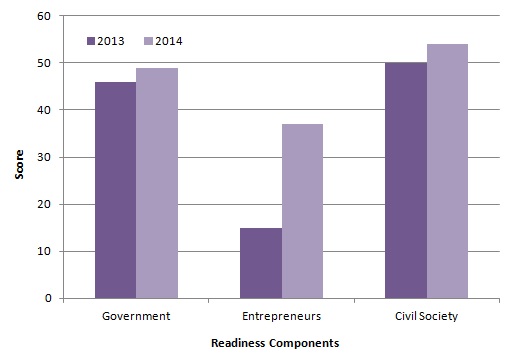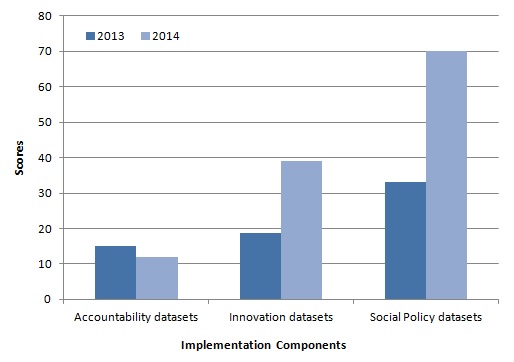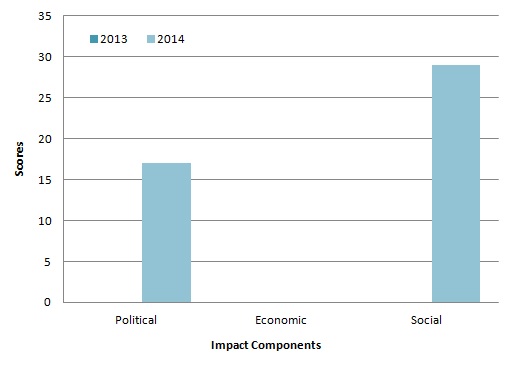Today, the World Wide Web Foundation has released the second edition of the Open Data Barometer. This 86-country study analyses global trends in open data, and provides a comparative view on countries and regions, using a blend of primary and secondary research data, with the aim of uncovering the true impact of open data around the world. It scores nations based on the Readiness, Implementation, and Impact of their open data initiatives.
Indonesia is the biggest climber in this year’s Barometer
The study reveals that in a vast majority of the countries examined, access to government data in open formats and under an open license remains a significant challenge. Most countries still do not publish datasets which could help beat corruption and improve governance and public services. Notably, the report also shows that most of the studied countries do not have open data fixed in their laws, shielding agencies and institutions from needing to proactively and mandatorily disclose government budget and spending data, health and education records, and other critical public information.
In spite of this global trend, Indonesia registered a strong performance in the 2014 Barometer, moving up the ranks to 36th place overall making it the best performing country from the lower middle income group. Adding to that, it is also this year’s biggest climber in the rankings, rising 16 places from last year’s 52nd place. This improvement in scores allowed for Indonesia’s significant rise to surpass South Africa, Philippines, Turkey, Costa Rica and India – all countries that ranked higher in 2013.
What’s driving these results?
Several factors contributed to Indonesia’s strong performance that raised scores across the various components. This includes the growing support and commitment to open data by the government and the increased awareness of citizens, entrepreneurs and civil society organizations of the value of openly available data.
Readiness

2013: Government 46%, Entrepreneurs 15%, Civil Society 50%
2014: Government 49%, Entrepreneurs 37%, Civil Society 54%
Looking at the Readiness scores, it is evident that there is only a marginal change in the Government component. This is largely due to the fact that most of the current open data initiatives both at the national and local levels had already been underway and where therefore already registered in the first edition of the Barometer, but only gained full speed over the past months which is well-reflected in the Implementation score. The small improvement in civil society readiness can be explained by civil society in Indonesia becoming increasingly aware of and engaging with open data. What is interesting is the change in the Entrepreneurs component which can be attributed to some extent to the rising number of open data challenges and competitions where developers and start-ups are encouraged to build businesses based on or informed by open data.
Implementation

2013: Accountability 15%, Innovation 19%, Social Policy 33%
2014: Accountability 12%, Innovation 39%, Social Policy 70%
The Implementation sub-index marks the strongest change with Indonesia’s score doubling compared to last year. This is not surprising as the government has launched an open data initiative and has released 905 datasets from 26 agencies as open data. The rise in the Implementation score is mainly due to the release of data in the Social Policy dimensions, such as health, education, environment and census. The report also shows a significant improvement in the Innovation datasets, particularly a growth in the public transport and trade data that could spark innovation across the country. However, scores for some datasets such as maps, and those falling under Accountability, including government spending, company registers and crime statistics, have gone down. In some cases this was due to the data not being sufficiently up to date.
Impact
2013: Political 0%, Economic 0%, Social 0%
2014: Political 17%, Economic 0%, Social 29%
Last year, no positive impacts from open data were observed in Indonesia. This year, however, there are clear signs of emerging impacts in both the political and social space. In the Social Impact component, researchers noted impacts through open data on the relationship of marginalised groups with the government. An example mentioned is the creation of Terong village, where citizens in remote locations have access to data that inform decision-making.
What else is going on in the open data space in Indonesia?
We have noted and welcome a strong increase in open data related activities in Indonesia that we think are worth sharing, even though some of them were not conducted in time to be included in this year’s Open Data Barometer.
Our friends from the School of Data visited Jakarta to run open data trainings and workshops. Events like HackJak, a hackathon that focused on the use of transportation and financial data provided by the Jakarta city government, yielded interesting results, such as easily accessible online timetables and routes for the local bus system, TransJakarta.
The Jakarta city’s own open data initiative seeks to promote a fruitful collaboration between government and citizens to tackle the most pressing challenges in the city through open data. Other projects, such as PETA Jakarta and Floodtags, make use of social media data and crowd-sourcing to map flooded areas and heavy rainfall in Jakarta.
Outside of Indonesia’s capital, open data projects are popping up in cities like Bandung, Bojonegoro and others. In Banda Aceh the city government and local civil society groups worked together to identify ways to improve education in the city based on data made available by the education agency.
And in the recent Indonesian national elections, the availability of easily accessible election data and the use of the same by Kawal Pemilu or Pemilu API has helped prevent manipulation of the results.
These are only some of the initiatives already in place driving open data to the forefront in Indonesia. Even more projects and efforts are underway or happening, and we hope to see this trend continue as the country propels itself forward for a more transparent and inclusive government – with fruitful innovations from well-capacitated civil societies and entrepreneurs – through open data.

Leave a Reply